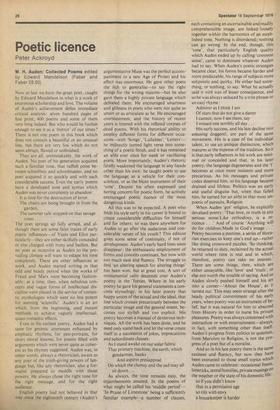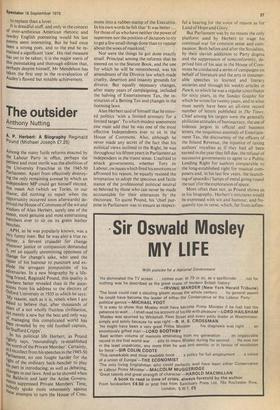Poetic licence
Peter Ackroyd
W. H. Auden: Collected Poems edited by Edward Mendelson (Faber and Faber £8.50) Now at last we-have the great poet, caught by Edward Mendelson in what is a work of enormous scholarship and love. The volume of Auden's achievement defies immediate critical analysis: seven hundred pages of fine print, 400 poems and some of them very long indeed. But who would be foolish enough to see it as a 'mirror' of our times ? There is not one poem in this book which does not contain a beautiful or an unusual line, but there are very few which do not seem abrupt, flawed or unfinished.
They are all, unmistakably, the work of Auden. No poet of his generation acquired such a familiar tone, that raffish poise between schoolboy and schoolmaster, and no poet acquired it so quickly and with such considerable success. Even the early poems have a developed tone and syntax which Auden was never Completely to abandon: It is time for the destruction of error.
The chairs are being brought in from the garden, The summer talk stopped on that savage coast ...
The poet springs up fully armed, and although there are some faint traces of early poetic influences—of Yeats and Eliot particularly—they are either skilfully concealed or else charged with irony and bathos. But no poet as receptive as Auden to the prevailing climate will want to escape his time completely. There are other influences at work, and Auden started writing in that odd and heady period when the works of Freud and Marx were becoming fashionable; at a time, then, when nebulous concepts and vague forms of intellectual discipline were placed in the service of romantic mythologies which were no less potent for seeming 'scientific'. Auden's is an art which, from the beginning, used instant methods to achieve vaguely intellectual, quasi-romantic effects.
Even in his earliest poetry, Auden had a taste for gnomic utterances enhanced by emphatic rhythms, for pen-portraits, for short moral lessons, for poems filled with arguments which were never quite as coherent as his rhymes suggested. Auden was, in other words, always a rhetorician, aware as any poet of the truth-giving powers of language but, like any rhetorician, also a formalist prepared to meddle with those powers. He always chose the right tone for the right message, and for the right audience.
English poetry had not behaved in that way since the eighteenth century (Auden's argumentative Muse was the perfect accompaniment to a new Age of Prose) and his effect was enormous. He gave other poets the itch to generalise—to say the right things for the wrong reasons—but he also gave them a highly private language which defeated them. He encouraged smartness and glibness in poets who were not quite as smart or as articulate as he. He encouraged overstatement, and the history of recent years is littered with the inflated corpses of -dead poems. With his rhetorical ability to employ different forms for different occasions—with 'Songs', 'Lullabies', 'Letters'— he indirectly turned light verse into something of a poetic fetish, and it has remained an alibi ever since for weak or vacillating poets. More importantly, Auden's rhetoric fatally weakened the language in any hands other than his own : he taught poets to use the language as a vehicle for their consciences, or as the blunt instrument of their 'tone'. Despite his often expressed and boring concern for poetic form, he actively encouraged poetic licence of the most dangerous kinds.
All this was to be expected. A poet who finds his style early in his career is bound to create considerable difficulties for himself and for others; so was there anywhere for Auden to go after the audacious and considerable verses of his youth ? This edition gives some sense of continuity, if not of development. Auden's early hard lines soon disappear; the enthusiastic employment of forms and conceits continues, but now with too much ease and fluency. The struggle to find 'an altering speech for altering things' has been won, but at great cost. A sort of monumental calm descends over Auden's poetry in the 'forties. Where in his early poetry he gave his general statements a concrete etymology, in his later poetry that happy union of the actual and the ideal, that line which crosses precariously between the particular image and the general intent, becomes too stylish and too explicit. His poetry becomes a manual of dexterous techniques. All the work has been done, and he need only stand back and let the verse create itself in a succession of jokes, imprecations and subordinate clauses: As I stand awake on our solar fabric That primary machine, the earth, which gendarmes, banks And aspirin presuppose On which the clumsy and the sad may all sit down ...
As always, the tone remains easy, the enjambements assured. In the poems of what might be called his 'middle period'— 'In Praise of Limestone' being a sufficiently familiar example—a number of clauses,
each containing an ascertainable and readily comprehensible image, are linked loosely together within the harmonics of an established tone. Nothing is disordered; nothing can go wrong. In the end, though, this 'tone', that particularly English quality which Auden ended up by calling 'common sense', came to dominate whatever Auden had to say. When Auden's poetic strategies became clear, his forms became harder and more predictable, his range of subjects more solipsistic and quirky. He either had something, or nothing, to say. What he actually said it with was of lesser consequence, and so he was always seduced by a trite phrase or an eas)% rhyme:
Admirer as I think I am Of stars that do not give a damn I cannot, now I see them, say I missed one terribly all day . . .
His early success, and his late decline into amusing doggerel, are part of the same movement. His is a case of the individual talent, to use an antique distinction, which matures at the expense of the tradition. So it is that early influences in his work are minimal or concealed and that, in his later poetry, the language degenerates and the 'I" becomes at once more insistent and more precarious. As his messages and private codes deserted him, so his language became drained and lifeless. Politics was an early and useful disguise but, when that failed him, he turned for an alibi to that most unpoetic of pursuits, Religion.
When Auden 'got' religion, he explicitly devalued poetry : 'That love, or truth in any serious sense/Like orthodoxy, is a reticence . . .' And of course 'Anything will do for children/Made in God's image . . • Poetry becomes a pastime, a series of Horatian exercises to keep one's end up—rather like doing crossword puzzles. 'So thinking, he returned to duty, reclaimed by the actual world where time is real and in which, therefore, poetry can take no interest. There are some things, then, which are either unsayable, like 'love' and 'truth', or else not worth the trouble of saying. And so Auden slowly pushed himself and his art into a corner—'About the House', as it turned out. This may seem strange after the heady political commitment of his early years, when poetry was an instrument of belief, but it was natural for him to abscond from History in order to nurse his private pleasures. Poetry was always concerned with instruction or with entertainment—always, in fact, with something other than itself. Auden's progress from politics to quietism. from Marxism to Religion, is not the progress of a poet but of a moralist.
And so in his late poetry there is the same easiness and fluency, but now they have been entrusted to those small topics which Auden came to celebrate: occasional feasts, limericks, moral homilies, private musings on the weather or the state of his domestic life:
as if you didn't know that in a permissive age so rife with envy a housekeeper is harder to replace than a lover. ...
It is dreadful stuff, and only in the context of over-ambitious American rhetoric and tawdry English poetasting would his last Poems seem interesting. But he had once been a strong poet, and to the end he rernained a significant 'case'. His real measure has Yet to be taken; it is the major merit of this painstaking and thorough edition that, Perhaps despite himself, Mr Mendelson has taken the first step in the re-evaluation of Auden's flawed but notable achievement.






































 Previous page
Previous page